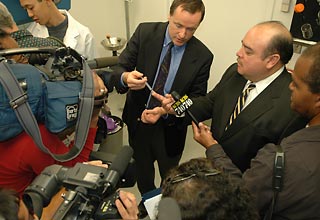UC Berkeley Press Release
California stem cell institute awards training grants, but money will have to wait
BERKELEY – The California Institute for Regenerative Medicine (CIRM) last week approved its first grants, among them a $2.5 million training grant to the University of California, Berkeley, to establish training in the scientific and social issues surrounding the study and use of stem cells.
 In a November 2004 media briefing, Kevin Healy of bioengineering squirts hydrogel on the finger of California Lt. Gov. Cruz Bustamante during a tour of Healy's laboratory. Healy hopes to engineer hydrogels to support and nurture human embryonic stem cells. (Steve McConnell/UC Berkeley NewsCenter) |
The three-year grant to UC Berkeley and Children's Hospital Oakland Research Institute was the only one of the 16 grants, totaling $38.9 million, to include fellowships to educate lawyers and humanists in the unique bioethical, sociological and legal issues raised by stem cell research. Most of UC Berkeley's 12 fellowships will support student and post-doctoral researcher training in the science, medical application and technology of stem cell research. The institute grants, announced Friday, Sept. 9, will train about 170 scholars each year throughout the state.
"This grant allows us to go forward with our training program, to establish a curriculum and solidify our program in stem cell biology," said Randy Schekman, UC Berkeley professor of molecular and cell biology and leader of the campus's stem cell effort. The training program will fit nicely into the newly established UC Berkeley Stem Cell Center, to be located in Koshland Hall in a laboratory separated from other federally funded research. Separate labs will allow experiments on non-federally sanctioned embryonic stem cell lines and perhaps development of new lines.
"The chancellor kindly gave us $1 million to create the Stem Cell Center, but campus stem cell research is too diverse for this to go far. We plan to apply to CIRM for research grants, but until then, we will have to take a more focused approach in crafting a coherent set of experiments people can do in the center," Schekman said.
The hitch, for the moment, is that the stem cell institute's pockets are empty. Dispersal of $3 billion in research and training grants, mandated by Proposition 71 to start earlier this year, has been delayed because several groups have sued in state court to block California from issuing bonds.
According to the Los Angeles Times, institute chairman Robert Klein said "we had to announce the grants today, to make it clear that California is poised and ready to recruit the nation's best and brightest stem cell researchers."
In a press release distributed on Friday, the CIRM said the new program will be funded through a form of bridge financing called bond anticipation notes, which are designed to be purchased by philanthropic individuals and institutions. The financing team of the Independent Citizens' Oversight Committee (ICOC) intends to proceed with issuance of the first notes in October.
"This is an exciting moment for the CIRM, as these awards mark the first step in our scientific program of stem cell research - an accomplishment we have been able to achieve in less than one year as a state agency," said Zach Hall, the institute's president, in the news release. "The CIRM training program established today will be the most comprehensive training program to date in the field. It will provide a pipeline of highly trained basic and clinical investigators for the research that CIRM will fund in California."
The CIRM was set up last year after the passage of Proposition 71, the California Stem Cell Research and Cures Initiative, which called for the establishment of an entity to make grants and provide loans for stem cell research, research facilities and other vital research opportunities. The ICOC was established to provide oversight and management of the institute. The grants approved at the oversight committee's meeting in Sacramento were the first grants in the CIRM Training Program in Stem Cell Research.
UC Berkeley teamed up with researchers at the Children's Hospital Oakland Research Institute to offer training opportunities to graduate students and post-docs and organized a stem cell center to consolidate research activities in gene expression, tissue engineering and the analysis of cord blood stem cells. The training program's emphasis on stem cell technology will be complemented by teaching from faculty in the humanities, social sciences and law.
The stem cell research fellowship at UC Berkeley's School of Law (Boalt Hall) is expected to total $50,000 a year and be split between two third-year law students each year. The Boalt Hall fellowship will focus on such legal issues as intellectual property rights, donor consent, ownership of tissue, management of research conflicts of interest, distribution of royalties, access to health care applications and financial returns to the state.
Marjorie Shultz, the Boalt Hall professor who helped develop the law school's fellowship proposal, said the UC Berkeley program will take advantage of the campus's intellectual richness. "With its strengths across the life sciences, humanities and law, Berkeley is uniquely positioned to address the myriad interdisciplinary issues that arise from stem cell research," she said.
In its review, the Grants Working Group of the ICOC praised the UC Berkeley proposal and called its law, ethics and humanities programs "stellar."

